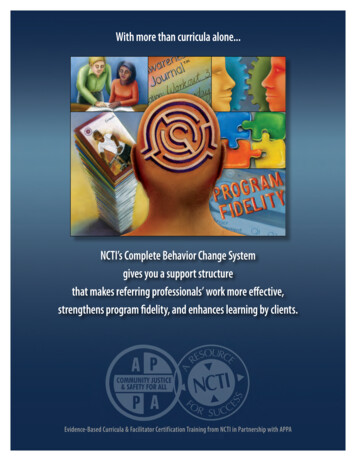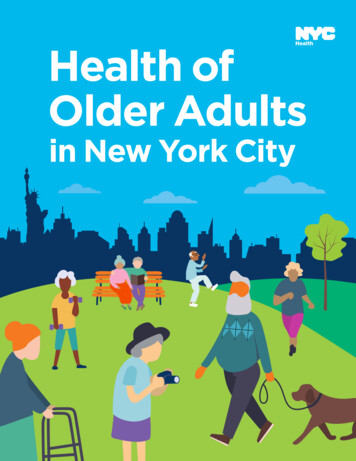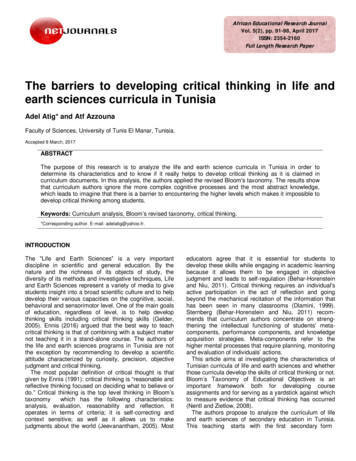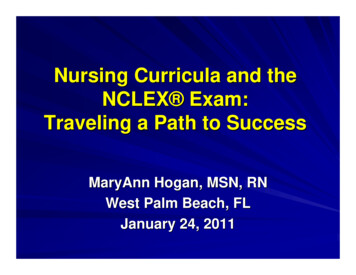
Transcription
With more than curricula alone.NCTI’s Complete Behavior Change Systemgives you a support structurethat makes referring professionals’ work more effective,strengthens program fidelity, and enhances learning by clients.Evidence-Based Curricula & Facilitator Certification Training from NCTI in Partnership with APPA
Evidence-Based Curricula & Facilitator Certification Trainingfrom National Curriculum & Training Institute in Partnership withthe American Probation and Parole AssociationNational Curriculum & Training Institute , Inc.319 E. McDowell Road, Suite 200 Phoenix, Arizona 85004800.622.1644 www.NCTI.org info@NCTI.org
NCTI’s Complete Behavior Change SystemNCTI’s recognized, evidence-based curricula and APPA-accredited, facilitatorcertification training come with a complete system of powerful tools that helpsyou create an effective path to behavior change.NCTI’s Evidence-Based Curriculais recommended by APPA andprovides a large selection ofcurricula targeting criminogenicneeds, risk-level, and age as wellas life skills. Addressing differentlearning styles, while beingdelivered in a highly interactive,group-process format, NCTI’scurricula encourage participationand comprehension. (pg 2)(See full curricula list, pg 10)Extend Learning Beyond the Classroom withCog Talk and Structured Homework. NCTI’ssystem of recommended session schedules,coordinated homework, and easy-to-use, guidedquestions for referring professionals is availablefree of charge for all NCTI curricula. (pg 6)Improve Communicationwith NCTI’s Real Colors Personality Instrument,a unique and effective toolfor understanding humanbehavior, uncoveringmotivators, and improvingcommunication amongstdiffering personalities. (pg 7)NCTI’s Complete Behavior Change Systemincorporates the National Institute of Correction’seight key principles of effective interventions. (pg 9)APPA-Accredited FacilitatorTraining prepares facilitatorswith direct experience and assistsin consistent curricula delivery.NCTI’s easy-to-use, comprehensivefacilitator guidebooks showparticipant workbook pagesnext to step-by-step instructorguidelines. Facilitators master howto help offenders learn throughparticipation and a positivereinforcement process. (pg 4)Strengthen Program Fidelitywith implementation andtechnical assistance, webinarsfor continuing education offacilitators, supervising officers,and referring professionals. plus,pre- and post-tests, and facilitatormonitoring tools. (pg 8)Evidence-Based Curricula & Facilitator Certification Training from NCTI in Partnership with APPA 2014 NCTI, All rights reserved. SKU 191300011
Recommended by APPA, NCTI’s cognitive-basedcurricula clearly align with the models that researchhas proven to be effective in reducing recidivism.NCTI Curricula address differentlearning style needs while beingdelivered in a highly interactive,group-process format whichencourages participation andcomprehension.Professionally structured toalign with the NIC principles ofevidence-based research, NCTI’sComplete Behavior ChangeSystem offers Crossroads , oneof the most comprehensiveselections of cognitive curriculaavailable.NCTI Crossroads curricula addresscriminogenic needs and risk-levelfor adult and juvenile participants.In addition, NCTI offers several lifeskills curricula. NCTI curricula areprimarily designed for medium andhigh-risk offenders, however, NCTIalso has curricula available for lowerrisk offenders plus numerous life skillscurricula such as parenting and jobreadiness. NCTI’s Crossroads curriculaare available in both English andSpanish. See a full listing of all NCTIcuricula on pages 10-13.Crossroads curricula follow a precisesequence that leads participants from ageneral level of discussion to a specificbehavioral commitment. This generalto-specific movement accomplishes fiveimportant goals:1. Enables individuals to see the processas relevant to themselves and theirparticular situation2. Adapts the process to theparticipant’s own learning styleby including lively, responsibilityoriented exercises that require fullparticipation and involvement3. Expands personal comfort zones andexpectationsWith millions of participantsnationally over thirty years, plusdirect experience as a private provider,NCTI’s curricula has been praisedfor ease-of-use and effectiveness ofoutcomes. Clients served across thecountry include: Probation departments Juvenile courts Federal, state, county, andmunicipal courts Private providers Therapists Detention centers Jails Military brigs Prisons Rehabilitation centersCog Talk NEW to NCTI’s Complete BehaviorChange System4. Internalizes information andhelps group participants practicepro-social skills5. Enhances the opportunity forpersonal discoveryCog Talk is a reference guide toCrossroads curricula which providesstructured homework and creates linksbetween the facilitator, the referringprofessional, and the participant. Thisincreases meaningful dialogue andreinforces new cognitive concepts andbehaviors. (pg 6)2Evidence-Based Curricula & Facilitator Certification Training from NCTI in Partnership with APPA 2014 NCTI, All rights reserved. SKU 19130001
NCTI’s easy-to-use, comprehensive facilitator guidebooksshow participant workbook pages next to step-by-stepinstructor guides.NCTI’s Crossroads curricula addresscriminogenic needs and risk-levelas well as adult and juvenileparticipants. In addition, NCTIoffers several life skills curricula.The following Crossroads facilitatorguide sample page is taken from AdultCognitive Life SkillsDesigned for medium to high-riskoffenders, the adult Cognitive Life Skillscurriculum offers an extended andcomprehensive educational process tohelp participants overcome negativebehavior patterns, and enable them tolive better within their environment.Through activity-enhanced workbooks,participants learn how to establishpositive, goal-directed behaviorpatterns, and understand the processnecessary to achieve pro-social behavior.Facilitator InstructionsPurpose To help the participantsunderstand that their criminal activityresulted in victimization of otherpersons, their own family and theircommunity.Possible Pitfalls People often fail torecognize that their criminal behaviorimpacts a wide range of people andsociety. They may minimize the impact oftheir crime by comparing their crime withother, more obviously serious crimes.Learning Activity “Who Is theVictim?” and “News Articles”Approximate Time 60 minutes.A brief description of thePurpose and PossiblePitfalls associated withthis componentThe names andlocations of LearningActivities forthe componentThorough, descriptivefacilitator instructions,with references to theAppendix for tools andactivitiesA complete Workbookpage that matcheswhat the participantsare usingEvidence-Based Curricula & Facilitator Certification Training from NCTI in Partnership with APPA 2014 NCTI, All rights reserved. SKU 191300013
Facilitator Certification Training from NCTI providesall the skills necessary to successfully facilitate NCTI’scognitive behavior change curricula.Facilitator Certification TrainingSessions: NCTI’s fast-paced, interactiveThe APPA & NCTI partnershipprovides nationally-accreditedcognitive facilitator certificationCertification training is required forindividuals wishing to use NCTI’scognitive behavior change curricula,Crossroads , to ensure fidelity inthe delivery of programs. NCTI, inconjunction with APPA, presents a fiveday course for individuals to achievenationally-recognized certification.Real Colors Certification is Included in NCTI’sCognitive FacilitatorCertification TrainingAdult Version – EnglishReal Colors training provides practitioners with theskills necessary to successfully facilitateour cognitive behavior change curricula.These training sessions address theimportance of individual learningstyles, how to use activities, games andsmall groups to enhance the learningprocess, and practice facilitation skillsusing NCTI’s Complete Behavior ChangeSystem. These training sessions areapproved for 35 Professional ContactHours, through our partnership withAPPA.NCTI’s facilitator training teachessensitivity to learning style, levelof motivation, gender and culture.Facilitators master how to helpparticipants learn through participationand a positive, reinforcement process. Inaddition, NCTI certifies facilitators inour Real Colors Personality Instrumentto improve communication skills.Real Colors is an effective tool forunderstanding human behavior,uncovering motivators, and improvingcommunication amongst differingpersonalities.Certified Facilitators will learn to:1. Instruct individuals in clarifying therelationship between values, attitude,and behavior with consistency indelivery.2. Facilitate an array of cognitivebehavioral, offense-specific curriculafor juvenile and adult individuals.3. Create a supportive environmentbased on trust that allows for trialand error.4. Teach understanding andappreciation of one’s owncommunication and learning styleand the styles of others by usingthe NCTI Real Colors PersonalityInstrument.5. Facilitate the group process usinglively, interactive exercises toinvolve even the most disinterestedindividuals.6. Construct open-ended questionsto elicit an intrinsic commitment tochange.7. Use structured homework andNCTI’s Personal Awareness Journal to encourage practice of pro-socialbehaviors learned in group sessions.When used in conjunction withCrossroads curricula, Real Colorsquickly provides a common ground forcommunication between participantsand facilitators. In a very short time,participants begin to understand theirown personality styles. (pg 7)4Evidence-Based Curricula & Facilitator Certification Training from NCTI in Partnership with APPA 2014 NCTI, All rights reserved. SKU 19130001
The American Probation andParole Association, APPA,strives to improve standardsand communication inthe field of communitycorrections.NCTI’s model of cognitive behavior changeworks because we focus on the internal motivatorsof values and personal attitudes.The American Probation and ParoleIt is a common misconception,particularly among educators,that once a person has been toldsomething, the information beingdelivered will automatically causea change in behavior. This is simplyAssociation is an internationalassociation composed of individualsactively involved with probation, paroleand community-based corrections,in both adult and juvenile sectors. Alllevels of government associated withthe executive, judicial and legislativebranches are counted among itsconstituents.By taking the initiative, APPA has grownto become the voice for thousands ofprobation and parole practitionersincluding: line staff, supervisors, andadministrators. Educators, volunteersand concerned citizens with an interestin criminal and juvenile justice arealso among APPA’s members. Withthe combined input of all its members,the association represents a strong,unified voice for the field of communitycorrections.not the case. NCTI’s curricula help eachparticipant understand that valuesand attitudes influence their behavior.By quantifying these concepts andseeing the inconsistency in their ownlives, participants want to make acommitment to change.The NCTI approach focuses on intrinsicchange. Intrinsic change is differentthan extrinsic change which simply tellsa person of the adverse consequencesof a certain behavior. Intrinsic changehelps a participant see the personalbenefits of new behaviors and motivatesthrough the participant’s own visionof improved benefit. Intrinsic change ismore effective and much longer-lastingbecause it is internal motivation, ratherthan instruction from an external source.Another mistaken belief is thatit takes long periods of time for aperson to change their behavior.NCTI’s approach has proven that oncea participant becomes aware of theneed to change, commits to change,and learns the skills necessary to affectnew behavior, change can happenquickly. There are, of course, somebehaviors that are harder than othersto extinguish, and there are new skillsthat are difficult for some participantsto master. But even complex behaviorchange can take place in a matter ofweeks, rather than months or years.What most participants need is to beshown a better way to behave and to beprovided with skills to behave inthat way.NCTI has found that working in groupsis a more effective format for changeto occur. Participants can see otherschanging, they can see successes inothers that motivate them to attemptchange, they draw reinforcement fromothers, and they can celebrate successeswith other participants. Changingbehavior is easier when it is done withothers.Evidence-Based Curricula & Facilitator Certification Training from NCTI in Partnership with APPA 2014 NCTI, All rights reserved. SKU 191300015
Cog Talk extends learning beyond the classroom with structuredhomework and by bringing referring professionals into the learning loopwith facilitators and participants.Cog Talk is a user-friendly guidethat helps anchor the learningexperience.NCTI’s structured homeworkencourages pro-social practiceto reinforce new concepts.Cog Talk is a reference guide designedto create a link between the facilitator,the referring professional, and theparticipant, increasing meaningfuldialogue and reinforcing new cognitiveconcepts and behaviors for theparticipant.Practicing new behaviors with NCTI’sstructured homework helps participantsunderstand the connection betweentheir thoughts and their actions, anessential part of behavior change.Cog Talk breaks each Crossroads curriculum into two-hour sessions forease in program managementand supplies a homeworkassignment for each twohour session.Through guided questionsbased on motivationalinterviewing techniques,referring professionals canhold meaningful conversationswith their participants onconcepts they encounter ingroup sessions. This allowsthe participant to continueprocessing new informationand to discuss the skills theyhave been practicing in theirhomework assignments.Cog Talk is available free ofcharge to every agency andprovider who is utilizingNCTI’s Crossroads curriculum.6Evidence-Based Curricula & Facilitator Certification Training from NCTI in Partnership with APPA 2014 NCTI, All rights reserved. SKU 19130001Sample of a structuredhomework assignment.Sample Cog Talk page:Guided questions connectreferring professionals toclassroom learning.Structured homeworkreinforces new cognitiveconcepts and behaviors.
Improve communication between facilitators,referring professionals, and clients with Real Colors Personality Instrument.Real Colors is an effectivetool for understandinghuman behavior, uncoveringmotivators and improvingcommunication amongstdiffering personalities.By helping people recognize, accept,and learn to value the differences inothers, Real Colors training willstrengthen communication betweenfacilitators, referring professionalsand participants. For this reason, werecommend agencies train probation,parole, and other referring professionalsin Real Colors to allow communicationwith participants to be most effective.Together, NCTI’s Crossroads cognitivecurricula and Real Colors PersonalityInstrument provide facilitators theability to maximize their efforts ataffecting positive, pro-social behaviorchange in participants.traits include consideration ofculture, gender, motivational stages,developmental stages, learning stylesand communication styles. Thesefactors are what indicate a participant’sresponsiveness to particular typesof intervention services. Respondingappropriately to responsivity involveschoosing the right type of service bymatching the style and methods ofcommunication with the participant’sreadiness to make a change.Used in conjunction with Crossroadscurricula, Real Colors quickly providesa common ground for communicationbetween participants and facilitators.In a very short time,participants begin tounderstand their own personalitystyles. Then they begin developingthe skills of application that improvecommunication with others.Real Colors is an integral part of NCTI’sComplete Behavior Change System,our wide assortment of criminal justicecurricula and training programs.NCTI’s Real Colors PersonalityInstrument is grounded in the theory ofCarl Jung and validated in the researchof Myers-Briggs and Keirsey-Bates. Itcombines experience and research intoan exciting approach that is extremelyaccurate, understandable and easy toapply in everyday life.With an understanding of temperament,facilitators are better equipped toaccount for individual traits whenworking with participants. TheseAdult Version –EnglishReal Colors Evidence-Based Curricula & Facilitator Certification Training from NCTI in Partnership with APPA 2014 NCTI, All rights reserved. SKU 191300017
Strengthen Program Fidelity with technicalassistance, webinars, pre- and post-tests, andfacilitator monitoring tools.Program Implementationand Technical Assistance: Theimplementation phase of technicalassistance is designed to assist agenciesin a cohesive implementation of NCTI’sCrossroads cognitive curricula.The fidelity assurance phase of technicalassistance is crucial in maintaining anevidence-based program. This phase isfocused on monitoring the delivery ofthe NCTI curricula to ensure the efficacyof the principles of the NCTI model.Webinars are provided for continuingeducation of facilitators, supervisingofficers, and referring professionals.NCTI routinely offers webinars withtopics ranging from information aimedat helping professionals understandhow NCTI’s Behavior Change Systemworks to information and tips on how toimplement a new program for certifiedfacilitators and agency administrators.8Track increases in learning, establishfacilitator consistency and pin-pointareas for improvement with freepre- and post-testing, including aweb-based online tracking program.Pre- and post-tests are used tomeasure the participant’s increase inlearning for each course and allowprogram managers to ensure facilitatoreffectiveness, as well as measureprogram fidelity.NCTI has developed a web-basedsystem to assist the data entry andevaluation of pre- and post-test scores.Agencies are now able to enter theirown pre- and post-testscores and print Aggregate,Demographic, and Pre/PostBreakdown reports.Monitor curricula delivery consistencywith thorough facilitator evaluationforms. The Crossroads FacilitatorEvaluation Form is a tool designedto assist agencies in establishing andmaintaining program fidelity. This formprovides a consistent guideline to assista program monitor in their observationof a facilitator as they deliver theCrossroads curriculum in their groupenvironment. Facilitator evaluationforms are available free of charge to allagencies utilizing Crossroads curricula.Pre- and post-tests areavailable free of charge toagencies who are utilizingNCTI’s Adult and YouthCrossroads curricula.Evidence-Based Curricula & Facilitator Certification Training from NCTI in Partnership with APPA 2014 NCTI, All rights reserved. SKU 19130001
NCTI’s Complete Behavior Change Systemincorporates the National Institute of Correction’seight key principles of effective interventions.1) Address the Actuarial Risk / Needsof the Offender When available,NCTI uses Risk/Needs data foundto be essential for best practices incriminal justice. NCTI supports theuse of actuarial assessment tools thatfocus on both dynamic and staticfactors, provide a criminogenic needprofile, and have been validated onsimilar populations. This informationallows programs to better addressthe individual offender.2) Enhance Intrinsic Motivation Forlasting behavior change to happen,the offender must experienceintrinsic motivation. NCTI curriculauses a values-discrepancy modelwith the assistance of motivationalinterviewing techniques to enhancethe possibility of the intrinsic desiretaking place.3) Target Interventions:Risk Principle: NCTI curricula areprimarily designed for medium andhigh-risk offenders.Need Principle: NCTI curriculatarget specific interventions towardreducing criminogenic needs ofoffenders.Responsivity Principle: NCTIcurricula and certified facilitators aresensitive to temperament, learningstyle, level of motivation, gender, andculture of offenders.Dosage: NCTI curricula aredesigned to be delivered in twohour increments and we encourageprogram designs of two, 2-hoursessions per week.Treatment Principle: NCTI curriculaare written using a cognitivebehavioral approach. NCTI believessuch treatment is an integral part ofthe behavior change process.4) Use a Cognitive-BehavioralTreatment Model NCTI’s curriculaare written based on a cognitivebehavioral treatment model as wellas a cognitive dissonance model.NCTI uses a number of techniquessuch as: role-play, personal awarenessjournaling, skill practice, andbehavior modeling. Within a dynamicgroup setting, offenders begin tomake positive behavior changesby learning how to think and act inincreasingly positive, pro-social ways.5) Increase Positive ReinforcementA sustained behavior change processincreases the amount of positivereinforcements an offender receives.NCTI facilitators are instructed intechniques for encouraging offenderswith positive reinforcement whilemaintaining clear and consistentlyapplied rules.6) Engage On-going Support inNatural Communities Activeengagement of offender, pro-socialsupport during the treatmentprocess allows for greater offendersuccess. NCTI curricula encourageand provide opportunities forthe offender to practice positivebehavior change within their ownenvironment.7) Measure Relevant Processes /Practices NCTI routinely assessesthe changes in offenders’ cognitiveand pro-social skill development.NCTI’s pre- and post-tests data foreach curriculum is collected and usedto ensure facilitator and programfidelity. Our curricula have beenused throughout the United States,in programs that have successfullyreplicated reduced recidivism. NCTI’sfive day facilitator certificationtraining teaches facilitators to delivera standardized model, regardless oflocation.8) Provide Measurement FeedbackFacilitator & participant evaluationsare used to provide feedbackto referring agencies. Pre- andpost-tests provide an additionalmethod for obtaining feedbackand monitoring ongoing processes.Feedback is provided to offenders,facilitators, and NCTI staff in a varietyof ways in order to ensure increasedaccountability and program integrity.Evidence-Based Curricula & Facilitator Certification Training from NCTI in Partnership with APPA 2014 NCTI, All rights reserved. SKU 191300019
ADULTCrossroads Curricula LibraryAnger ManagementAll Crossroads curriculautilize a Facilitator Guide andcorresponding ParticipantWorkbook for each topic.Participant Workbooks areavailable in English and Spanish.Each curriculum is includedin Cog Talk , a free referenceguide that divides eachcurriculum into two-hoursessions, provides specifichomework assignmentsand additional open-endedquestions to continuecurriculum-specific conversationoutside of the group setting.The Adult Anger Managementcurriculum is designed to giveparticipants an opportunity to practiceskills that will allow them to positivelycontrol their behavior and the events intheir lives. Through activity-enhancedcomponents, individuals learn tosuccessfully control their emotions andchannel their energies in a positivedirection.Bad CheckThe Adult Bad Check curriculumemphasizes and teaches fiscalresponsibility as a resource to curbfuture bad check writing. By focusingon planning and goal setting activities,participants learn behaviors that reducethe likelihood of budgeting mistakesand bad decisions. When the workshopis coupled with a requirement to makefull restitution, both the offender andthe victim are dealt with judiciously.Cognitive Life Skills,Levels I & IIDesigned for medium to high-riskoffenders, the Adult Cognitive LifeSkills curriculum offers an extendedand comprehensive educationalprocess to help participants overcomenegative behavioral patterns, andenable them to be more productive intheir environment. Through activityenhanced components targetingcriminogenic needs, participants learnhow to establish positive, goal-directedbehavior patterns, and understand theprocess necessary to change negativebehavior.Cognitive Life Skills,for WomenDesigned for medium to high-riskfemale offenders, the Adult CognitiveLife Skills for Women curriculum offersan extended and comprehensiveeducational process to help womenovercome negative behavioralpatterns, become self-reliant, andenable them to be more productive intheir environment. Through activityenhanced components targetingcriminogenic needs, women learn howto establish positive, goal-directedbehavior patterns, and understand theprocess necessary to change negativebehavior. The length of the curriculumallows for greater development of theparticipant/facilitator relationship,providing an additional support base forthe participant.Domestic ViolenceDesigned for medium to high-riskoffenders, the Adult Domestic Violencecurriculum uses a unique, interactivemodel to allow participants to explorewhy they use violence to try to solveproblems. They practice the skillsnecessary to cope with interpersonalproblems in a nonviolent manner.Participants will learn that problemsthat they think are solved with violenceare never permanently solved, andindividuals will make a commitmentnever to use violence in theirrelationships.Evidence-Based Curricula & Facilitator Certification Training from NCTI in Partnership with APPA 2014 NCTI, All rights reserved. SKU 19130001
Drugs & Alcohol,Levels I & IIThe Adult Drugs & Alcohol curriculumuses a number of innovative roleplays, games and scenarios to helpparticipants understand the dangersof ingesting harmful substances.By exploring patterns of use andcontributing attitudes, individuals learnthe effects of their abusive behavior ontheir family as well as their future.DUIThe Adult DUI curriculum allowsparticipants to explore their decisionmaking process prior to drinkingthat places them behind the wheelonce intoxicated. By focusing on theirdecision-making process, rather thangory films about accidents or effects ofalcohol on the body, participants learnto make decisions and choices ahead oftime that will allow them to control thisdangerous, self-destructive behavior inthe future.Felony OffensesThe Adult Felony Offenses curriculumaddresses the needs of medium to highrisk offenders who have entered thecourt system for a wide variety of felonyoffenses. This curriculum uses activityenhanced components to providean in-depth process for gaining andpracticing new behavioral skills that canhelp participants achieve constructivelife changes. Individuals are encouragedto practice skills outside of the groupsetting and to report on the progressand problems they experienced duringpractice. The length of the curriculumallows for greater development of theparticipant/facilitator relationship,providing an additional support base forthe participant.JOBTECThe JOBTEC curriculum teaches thosecompetencies that the Department ofLabor and research have found to benecessary for finding and keeping ajob. Through this extensive curriculum,participants will learn practical jobfinding skills, practice positive andprofessional behavior, and explore theirown personal strengths and values.LarcenyThe Adult Larceny curriculum assistsparticipants in focusing on the processesthey went through when they broke thelaw. Participants will learn how certainattitudes can override a person’s senseof right and wrong and cause behaviorthat is contrary to his or her personalbeliefs. The curriculum establishes anatmosphere where participants canlearn from and accept their mistakes aswell as strengthen their ability to act inaccordance with what they believe.Minor in PossessionThe Adult Minor in Possessioncurriculum is designed for individualsbetween 18 and 21 years of age, whohave committed alcohol offenses. Thecurriculum focuses on dispelling thecultural myths surrounding drinking,understanding why one drinks, andovercoming peer pressure. Time isspent exploring other activities thatcan replace the “high” that resultsfrom drinking. Through this upbeatand exciting curriculum, participantsexamine their negative behavior, andlearn to make informed decisions.Misdemeanor Offenses,Levels I & IIThe Misdemeanor Offenses curriculumaddresses the needs of individuals whohave entered the court system for awide variety of misdemeanor offenses.Building on a foundation of activitiesand interactive components, thecurriculum helps individuals learn howto avoid negative influences, handlestress and take responsibility for theirdecisions. This skills-based curriculum isdesigned for first-time offenders.ParentingThe Adult Parenting curriculum helpsparents understand the process ofchanging negative behavior in theirchildren and motivating positivebehavior. Through activity-enhancedcomponents, parents learn how tocounteract negative behaviors usingmethods that are non-threatening,effective, and that build responsibility.Parents learn the difference betweenpunishment and discipline, and areencouraged to use discipline instead ofpunishment.ShopliftingThe Adult Shoplifting curriculumassists participants in focusing on theprocesses they went through when theyshoplifted. Through activity-enhancedcomponents, they learn to behavedifferently when faced with a similarsituation in the future. Participants willlearn how certain attitudes can overridea person’s sense of right and wrong andcause behavior that is contrary to hisor her personal beliefs. The curriculumestablishes an atmosphere whereparticipants can learn from and accepttheir mistakes and strengthen theirability to act in accordance with whatthey believe.Substance AbuseInterventionThe Adult Substance Abuse Interventioncurriculum addresses the needs of thelow-risk client who has become involvedwith the criminal ju
NCTI curricula are primarily designed for medium and high-risk offenders, however, NCTI also has curricula available for lower risk offenders plus numerous life skills curricula such as parenting and job-readiness. NCTI's Crossroads curricula are available in both English and Spanish. See a full listing of all NCTI curicula on pages 10-13.










